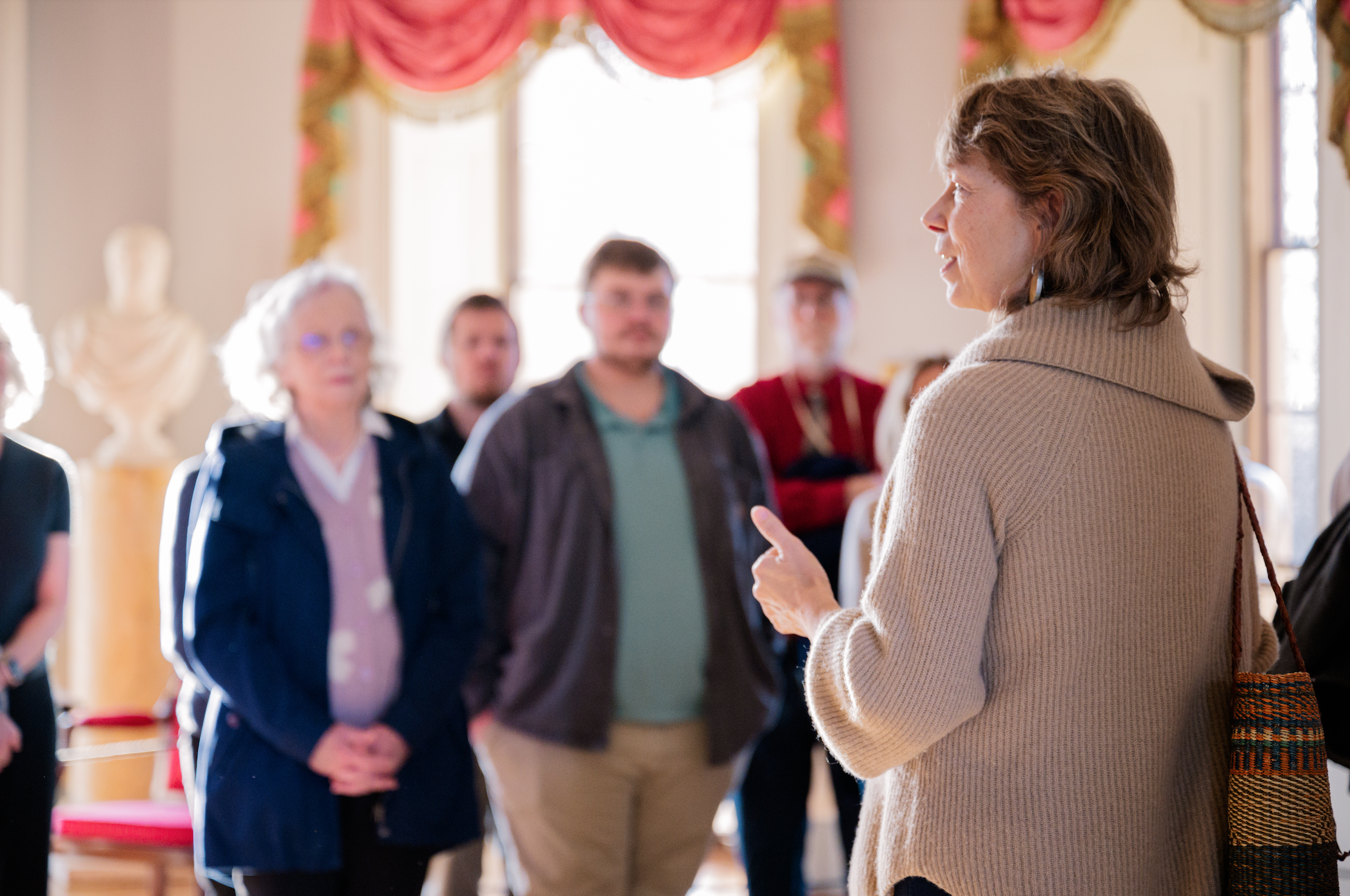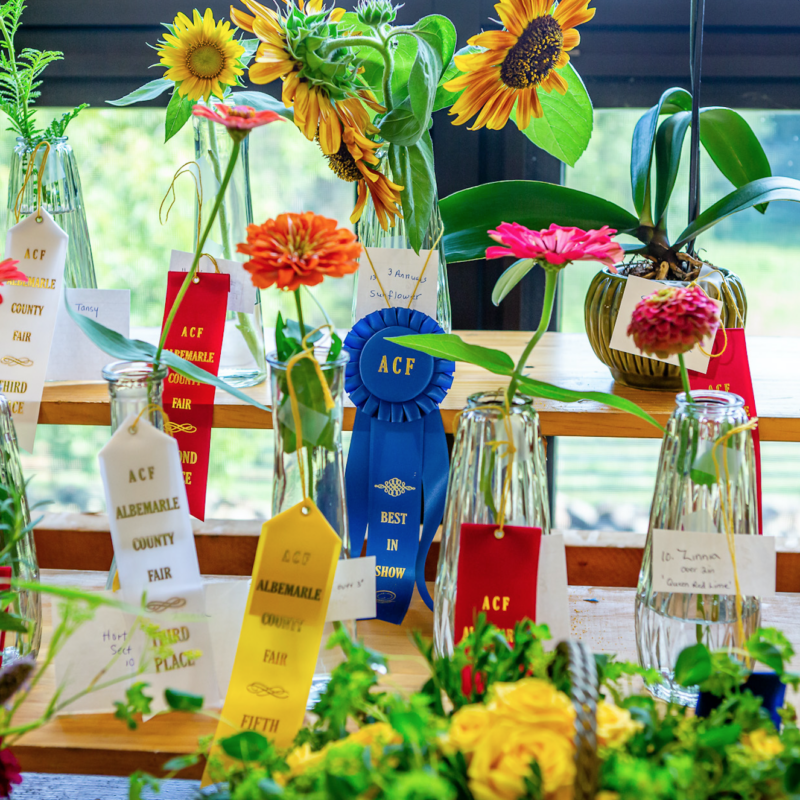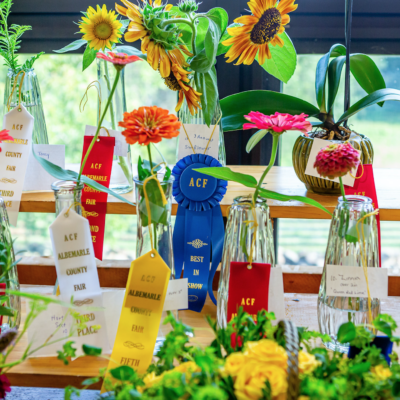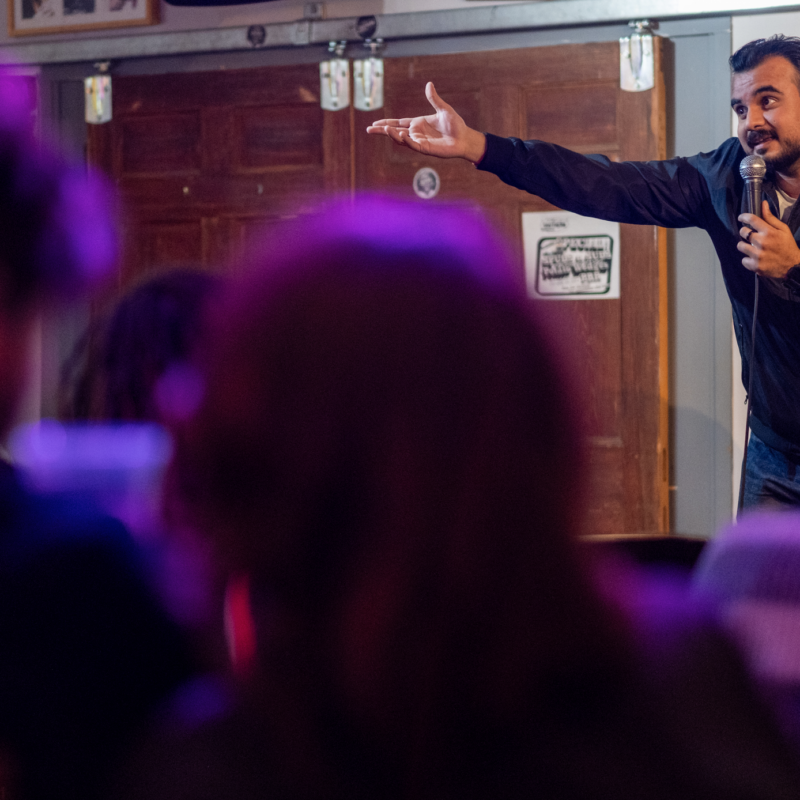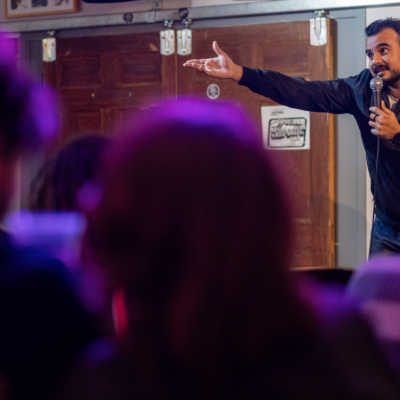Festival basicsWondering how the festival comes together? Festival Director Susan Coleman spilled the beans. I won’t ask you to pick a favorite, but what is one event that you are particularly excited about this year? This is the 17th annual Festival of the Book. How has the festival evolved over time? How do you go about finding participants and assembling the panels? How many people does the Festival draw? Why is this festival in Charlottesville? |
You can try to pick out the best events at The Virginia Festival of the Book, which runs March 16-20. But you’re likely reminded each year, as we are, that at the largest educational book event in the mid-Atlantic, it’s impossible.
So we previewed a handful of the 130 events that reflect the concerns of modern life. For readers who multitask, Slate editor Dahlia Lithwick speaks on balancing writing with being a mother. For those to whom life in 2011 is insufficiently alien, a star-studded team of sci-fi writers including L. Jagi Lamplighter casts an eye toward the future. For those preparing for the worst, Random Row Books launches a new and unrelated Anarchist Book Fair on March 19.
Of course, we missed a few. A couple important panels that might’ve flown under your radar? “Armed Humanitarians: The Rise of Nation Builders,” at a Thursday talk featuring the national security expert and Wall Street Journal reporter Nathan Hodge (March 17, noon, UVA Bookstore), and “Americans in China: John Service and Homer Lea,” with journalist Lynne Joiner and historian Lawrence M. Kaplan (March 18, 10am, City Council Chambers).
Mercifully, we didn’t aim to be comprehensive—just comprehensible. For complete listings, visit www.vabook.org.
Writers that mother, too
To most, local resident Dahlia Lithwick, senior editor and legal editor for Slate.com, is a writer. But to her kids she’s mom. She presents at “Women’s Initiative” on March 20, 2pm at the Village School with Kerry Day, executive director of The Women’s Initiative and author of Life in the Front Yard.
What role does your writing play in your family life?
I suppose writing is principally the thing I am doing when I am not playing Lego. Writing is the way I make sense of the world—it always has been. It’s also the way I try to talk about justice and law. I think my boys have grown up with a strong sense that what I write about is reaching to make things fair. I think they are proud of that but I think they also wish I could play Lego more. Also that I would give them more ice cream.
What will be the focus of your discussion with Kerry Day?
We will read from various pieces we have published about parenting and family and grief and life. The object is thinking about how we write about family and parenting and also contemplating whether there are ways in which writing on these subjects can help us move past the hard times.
How is balancing parenting and career different for writers than those with other occupations?
I think in most ways it’s easier for writers. We can meet the school bus most days and write at midnight as needed. But parenting has also taught me to live with imperfection: to stop and cook dinner after school rather than attempt a final flawless draft. No piece ever feels done once you’re a parent. But you start to realize that it matters less than being a parent anyhow.
|
Dahlia Lithwick |
Do you feel exposed when, as a policy writer, you write about intimate things like family and marriage?
I used to. And I certainly write about my kids less as they grow up. I want them to tell their own stories their own ways. When I first published something very personal (on miscarriage) I felt incredibly strange. Then I decided that if more Supreme Court correspondents wrote about their miscarriages I wouldn’t have felt so alone. —C.M.
Ride the Crime Wave
Snuffed out. Cashed in. Pushing daisies. They say that you write what you know, which does little to explain how the authors in this year’s Crime Wave series write murder so well—barring, of course, any deep, dark secrets. However, more than a few of them have had real experience helping to put cases to rest, and bring their professional experience to bear to write convincingly from the gumshoe side of things.
Consider Kathy Reichs, the forensic anthropologist whose Temperance Brennan novels were the basis for “Bones,” the Fox crime drama she now produces. If you didn’t snag tickets to her Saturday Crime Wave Luncheon at the Omni (March 19, noon, sold out) you can still head there later in the afternoon for a chat with Douglas Starr, Michael Capuzzo and retired FBI negotiator Gary Noesner (Saturday 2pm, The Omni). All have riveting nonfiction books out about some of the watershed cases in modern forensics.
|
Kathy Reichs |
For crime lovers more enamored with the classic mystery novel, there are a handful of panels with some of the genre’s heavy hitters, including one in which the authors of A Killer Plot, Stork Raving Mad, Shot Through Velvet and Dead Head (Ellery Adams, Donna Andrews, Ellen Byerrum and Rosemary Harris, respectively). There, authors talk about incorporating humor into their books.
The rookie cop that’d note each author above is a woman would also note that, at 4pm at the Omni, men of mystery alone touch on the darker side of the crime novel in “Deathly Thrillers.” There, Robert M. Brown (author of The Longbridge Decision), John Darrin (Screenshot), David Poyer (Ghosting) and Robert Troy (Denier of Sunlight) talk keeping the kill in the thrill. Rather than wonder about why men do this and women do that, shouldn’t we be worried about how (a) Charlottesville loves to read about crime at this annual event, and (b) the Omni is the ideal setting for a murder mystery?
Just don’t ask these authors about their secrets. —Spencer Peterson
Sci-fi Shakespeare
Read to escape? L. Jagi Lamplighter (Prospero in Hell) will be joined by fellow authors John Wright (Continuum), Maria Lima (Blood Heat: Blood Lines, Book 4), Steve White and Chuck Gannon (Extremis) on Friday for a discussion of science fiction and fantasy writing, March 18 at the JMRL Central Library, 6pm.
|
L. Jagi Lamplighter |
What will be the focus of your discussion?
In general, I believe that we will be discussing the joys and tribulations of writing science fiction and fantasy, what attracted us to the field, and perhaps some of the particulars of how we go about it. My husband, John C. Wright, and I know most of the other authors who will be appearing and have been on panels with them at conventions in the past. They are entertaining fellows, so it should be great fun.
The main character of Prospero in Hell is the Prospero of Shakespeare’s The Tempest. Why?
The interesting thing about this is that I just set out to write a fantasy story. I used Shakespeare as background material the same way I used Greek gods, fairies, and other beings from myth and fairy tale. It did not occur to me when I was writing that the story would have an extra appeal as a Shakespeare tie-in…but the series had received extra attention due to the Shakespeare theme—for which I am surprised but grateful.
Do sci-fi and fantasy writers face any unique challenges?
I am not sure what extra challenges we have. I do think we have some advantages. Other writers have to do real research. They have to make sure they get their facts right. SF and fantasy writers do have facts they have to get right (science fiction writers much more often than fantasy writers) but we can do what I like to call “creative research”—research done more for ideas to mine than for the facts themselves. This means that we can have all the fun of researching fascinating topics without the burden of worrying about getting some small detail wrong.
What are the rewards of the genre?
Fantasy is the genre of wonder, of moments that lift you beyond your normal life to glimpse something new and wondrous beyond. Creating such moments and being able to share them with readers is the greatest reward. —C.M.
Back and forth
|
"To Be Alive!" |
Collaboration guides two presentations from painter Trisha Orr and her husband, UVA poetry professor Greg Orr. We caught up with Trisha, who discussed the paintings her husband’s poems help inspire. The pair presents twice at the festival, at “Painting the Word, Wording the Paint,” on March 16, 4pm at Campbell Hall; and at “To Be Alive!” on March 17, 6pm, The Bridge/PAI.
Will you present new works?
The focus of our presentation at Campbell Hall will be a PowerPoint and discussion of our experiences with collaboration. The poetry reading at the Bridge the following day will be a poetry reading by Greg and an exhibit of paintings from our most recent collaboration—the poem-paintings that I think of as “prayer flags.”
Inside the Anarchist BookfairThink “contemporary Southern politics” and you might think of the 1980s rise of the religious right or Virginia Attorney General Ken Cuccinelli’s attempts to repeal the 2010 health care bill. In the region that was home to Martin Luther King Jr., Rosa Parks, and other giants of the civil rights movement, you might even find yourself wondering where all of the liberal activists have gone. Enter Charlottesville’s first Anarchist Book Fair (organizationally unrelated to the Festival of the Book). The fair is Saturday, March 19 from 1-7pm at Random Row Books and features a talk by Mo Karn, author of The South is Still Rising, a contemporary history of radical organizing in Richmond, as well as tabling by publishers and organizations, film screenings, a prisoner support workshop, and an organizational meeting for activists from around the region. According to organizer Luis Oyola, one of the goals of the fair is to counteract the challenges of organization faced by contemporary radicals. “This event will bring out a bunch of great publishers who are not very well known and allow community organizers to connect and share what they are doing with others,” says Oyola. “We encourage anybody who is interested in learning more about radical theory to join us.” Organizations will include regional groups such as The Wingnut House, The Flying Brick, and SPARC, as well groups from D.C., Baltimore and other surrounding areas. Go to cvilleanarchism.wordpress.com for a full schedule and more information. —Charlotte Muzzi |
How long have and you and Greg been collaborating?
We’ve collaborated officially on four projects involving painting and poetry. The first two projects began with Greg using my paintings as starting places for poems. In the first process (in 1996), the poems were primarily descriptive of the paintings; in the second series (2000), the poems became “equivalents” to the paintings.
Do you create together or are you inspired by each other’s finished works?
When we were invited to collaborate on the subject of “love” for a show at the Second Street Gallery in 2006, I thought that it would be a challenge to proceed in the opposite direction—for me to use his texts as the subject-matter for paintings. I had always been a painter of realist still lifes and I was actually surprised when I found a way to make paintings that used traditional means—color, light and space —to translate his poems into grid-based compositions.
The earlier poem-paintings were more painterly, less legible, [but] as I worked with the poems as subject-matter and my familiarity with them grew, I felt that I wanted the texts to be more bold and legible. The meanings of the poems gave me so much hope and courage during a difficult period that I wanted the words to be more graphic and bold, immediately available to the viewer. —C.M.
/10014_Dahlia-Lithwick_JS.jpg)
/crimewaveKathy_Reichs.jpg)
/lamplighter.jpg)
/orr-to-be-alive.jpg)
